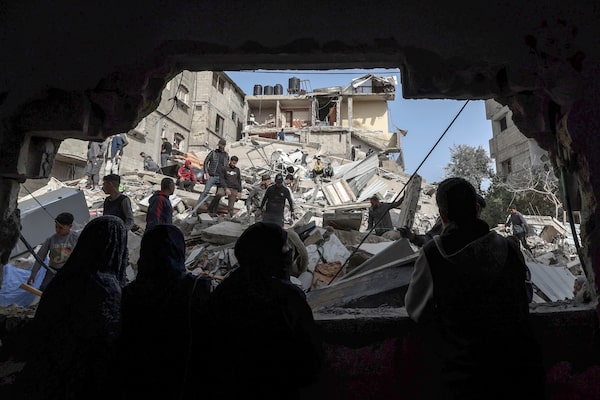
Palestinians check the rubble of buildings that were destroyed following an overnight Israeli bombardment in Rafah, in the southern Gaza Strip, on March 27.MOHAMMED ABED/Getty Images
Difficulties getting Israeli permission for foreign staff to work in Israel and the Palestinian territories are hampering efforts to get aid into war-shattered Gaza where civilians are facing imminent famine, according to UN data and aid workers.
Six aid workers from the UN and other groups interviewed by Reuters cited delays to visas as an example of red tape they say is thwarting aid to Gaza, nearly six months into Israel’s offensive against Hamas militants.
Israel’s Ministry of Foreign Affairs did not immediately respond to a request for comment. An Israeli official who asked for anonymity as the official was not authorized to speak publicly cited high demand as a challenge, and also raised question marks about some groups’ objectives, saying some aid workers “have designs that are not humanitarian”.
UN data shared with Reuters showed that 45 visa requests are pending, more than half of which have been on hold for over two months, and several stalled since at least November.
A further 20 UN requests pending since late 2023 have been completely dropped due to the delays. The affected missions were either abandoned or postponed, said the UN source who shared the data and asked not to be identified, fearing repercussions.
“This is slowing down the Gaza response at a time when we need to scale up and have more manpower to handle operations,” said the UN source.
The list showed the holdups were affecting 11 UN agencies with 18 visas pending for UN Palestinian refugee agency UNRWA; six for the World Food Programme; six with the UN children’s agency; and two with the World Health Organization.
Aid workers said Israel has previously said the delays were linked to staff shortages caused by the high number of army reservists called up for the war, which was triggered by the Islamist group’s attacks on southern Israel on Oct. 7.
But UN officials say the red tape burden has been exacerbated by Israel switching to a policy of granting visas for a maximum of six months, rather than one year, as before the war.
Israel says UNRWA, which provides aid and services to millions of Palestinian refugees in Gaza and the region, perpetuates conflict. It has accused 12 of the agency’s 13,000 staff of involvement in the Oct. 7 attacks. UNRWA has dismissed accused workers and a probe is under way.
International non-governmental groups also complain of growing visa difficulties and said some staff had been blocked at the border or received deportation orders.
Faris Arouri, director of the Association of International Development Agencies (AIDA) representing dozens of aid groups in the West Bank and Gaza including charity Oxfam, says there has been a halt in recommendation letters by Israel’s Ministry of Welfare and Social Affairs needed to submit visa applications.
This means that some 60 new visa requests cannot be filed while the “vast majority” of 57 aid workers whose visas already expired have had to leave, including many senior staff, he said.
“There are lots of problems to scale up operations to design or better manage the emergency response,” he said. “We’ve had problems in the past but never this bad.”
The Ministry of Welfare referred Reuters to the National Security Council (NSC) in Prime Minister Benjamin Netanyahu’s office, which did not respond to a request for comment. The Israeli official speaking on condition of anonymity said the NSC had become involved because of security concerns.
Some of the vacant aid jobs are in the Palestinian territories, while others are in Jerusalem, which serves as a hub for co-ordinating Gaza convoys of food and medicine through Israeli inspections. UN agencies are pressing Israel for more access in Gaza while Israel blames the UN for failing to distribute aid effectively.
The visa difficulties come after Israel blocked the UNRWA chief entering the Gaza Strip this month. Another top UN aid official’s visa was not renewed in December, with Israel alleging bias.